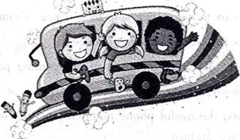题目内容
One morning, my newspaper wasn’t delivered on time. Since I always brought it to work, it upset me that I would have to pick one up on my way to work. After breakfast, I was already running late, but figured I could make it if I hurried.
As I pulled into the parking lot of the store, I noticed a young man in a wheelchair who seemed to be struggling. “Someone else will stop and help him,” I thought.
However, no one stopped. I got out, and walked over to see what the trouble was.
“Is there anything I can do?” I asked. It was then that I noticed he wasn’t able to speak, and was still struggling with the chair.
I looked down at the chair and noticed that the clamps (夹具) holding the electronic keyboard had apparently become loose causing the equipment to slip down, out of his reach.
I pulled it back into place and then re-tightened the clamps. He hit a key on the keyboard. An electronic voice told me, “Thank you.” He then found the control that steered (操纵) the chair, turned and left.
I got back in my car and headed off to work, completely forgetting my newspaper. As I drove, I felt a deep gratitude (感激). I was truly blessed to have the physical abilities that allow me to live a normal life. Here was this young man who relied on machines to get around and communicate. He probably dreamed about doing all the things that I thought were normal and simple.
It’s funny; fifteen minutes before that happened, I was whining because my morning paper hadn’t arrived on time. I was glad I helped the young man, because he helped me gain a new viewpoint on everything I had in my life.
1.Why did the author stop at the store?
A. To do his job. B. To have breakfast.
C. To buy a newspaper. D. To drive a colleague to work.
2.What was the young man trying to reach?
A. The clamps. B. The car key.
C. The wheelchair. D. The electronic keyboard.
3.What does the underlined word “whining” in the last paragraph mean?
A. Complaining. B. Worrying.
C. Arguing. D. Crying.
4.What did the author learn from the experience?
A. Treasure what we have. B. Treat the disabled nicely.
C. Technology has changed our lives. D. Don’s get annoyed over small things.
 通城学典默写能手系列答案
通城学典默写能手系列答案 金牌教辅培优优选卷期末冲刺100分系列答案
金牌教辅培优优选卷期末冲刺100分系列答案假如你叫李华,是一位成绩优秀的学生,你班班主任在安排座位时,让成绩好的学生和成绩差的学生作同桌,这在你们班成绩优秀的学生中引起了反响,大家就此进行了讨论。请以书信形式向报社编辑写封信,陈述学生讨论结果以及个人观点。
赞同 | 反对 | 你的观点 |
1.人人有长处和不足,成绩差的学生也有可取之处; 2.通过帮助学习差的学生的学习从而使他们建立自信。 | 1.部分学习差的学生常常违反校规,担心自己会受影响,养成坏习惯。 2.老是问问题,使自己不能专心学习。 |
注意:1.词数:100左右,短文的开头已为你写好,不计入总词数。
2.短文需包括表中所有要点,内容可适当发挥,以使行文连贯。
3.参考词汇:成绩差的学生:a slower student
____________________________________________________________________________________________
____________________________________________________________________________________________
____________________________________________________________________________________________
____________________________________________________________________________________________
____________________________________________________________________________________________
____________________________________________________________________________________________
____________________________________________________________________________________________
____________________________________________________________________


